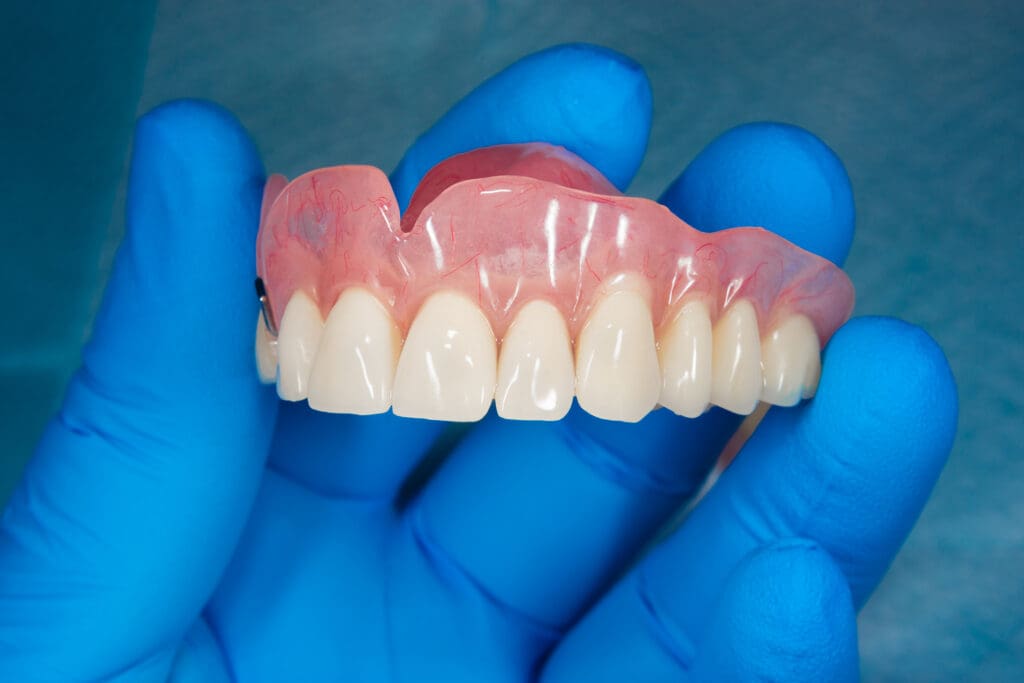Are your old dentures causing more issues than helping you? Do they struggle to stay in place or irritate your gums?
In the past, people who suffered from loose, missing, and unsightly teeth only had one choice to replace the appearance of teeth: a denture. Unfortunately, dentures have one of the lowest levels of patient satisfaction compared to other dental procedures. While dentures replace the appearance of teeth, they do not replicate the function of natural teeth.
If you are wearing dentures, have missing teeth, or are facing the prospect of losing teeth, contact your restorative dentist, Dr. Jason Petkevis. Dr. Petkevis has devoted much of his postgraduate training to treating complex dental concerns and problems, such as missing teeth.

Poor Fitting Dentures Are Bad For Your Health
Not only do poor-fitting dentures make it challenging to eat, speak, and smile, but they can also contribute to significant health risks that can compromise overall health.
- Bone Loss: Once a tooth is lost, the bone that once supported that tooth begins to deteriorate. Even the most well-made dentures will become loose as this bone deteriorates.
- Dietary Concerns: Poor-fitting dentures make it extremely difficult to chew foods. As a result, many denture wearers will consume more processed foods. This can lead to problems with weight and obesity, diabetes, increased risk of heart disease, and stomach problems.
- Decreased Hygiene: Poor-fitting dentures allow plaque and bacteria to build up behind and below them. This can lead to gum disease, which is strongly linked to heart disease and diabetes.
Solutions For Poor Fitting Dentures
Visit our restorative dentist in Chester Springs, PA for a consultation to address your poor-fitting dentures. Your mouth changes to adjust to lost teeth over time, so your current dentures may not fit right anymore. Depending on your needs and long-term goals, there are a variety of techniques to secure the fit of your dentures. Dr. Petkevis can repair your current dentures if they are broken. He can also create new modern dentures that will be more comfortable and a better fit.
Modern Implant-supported Dentures
Implant-supported dentures are permanently secured with dental implants. This treatment can greatly improve dentures’ fit and function; in some cases, an existing denture can be converted into an implant denture. This procedure includes surgically implanting up to four titanium posts to be secured to the denture. Your final restoration does not rub against your gums and will not need denture creams or special cleaners.
Benefits of implant dentures:
- Better retention, no chance of slippage
- Improved health of bone and gums
- Ability to eat without restrictions
- No adhesives needed
- More natural look and feel
Many patients who choose implant dentures will have all their teeth replaced on the same day. Strategic planning makes this possible. Dr. Petkevis will coordinate the placement of as few as four dental implants to anchor the denture.
Patient Review
Poor Fitting Dentures FAQs
Poorly fitting dentures are uncomfortable and can’t function properly. Learn more by reading the answers to these commonly asked questions.
How do I tell if my dentures fit poorly?
Many things can indicate an improper fit. The dentures may feel loose in your mouth or need extra adhesive to stay in place. The adhesive should never ooze out or overflow in the denture. It’s normal for dentures to feel bulky and awkward when you first get them. If you’ve had your dentures for a while, a change in fit or new discomfort indicates a problem.
What are the risks of poor-fitting dentures?
If your denture doesn’t fit well, your gums are the biggest sufferers. Ill-fitting dentures rub against your gum tissue, leading to sustained irritation and chronic inflammation of your mouth and lips. If this inflammation continues, it can lead to ulcers and other problems with your oral health, including infection.
Why do my dentures feel tight?
Improperly fitted dentures can pinch the gum tissue, causing discomfort. The dentures wear down the gum tissue without adjustment, causing gum recession. Tight dentures can also put more pressure on the jawbone, causing the bone to deteriorate faster.
Can ill-fitting dentures cause headaches?
Poorly fitting dentures can cause headaches and pain throughout your head and face. If your dentures are loose, you must clench your teeth, and the muscles strain to ensure the dentures stay in the correct place. The longer you go with this issue, the more pain and deterioration occur.
Can poorly fitting dentures cause me to gag?
Yes, loose dentures can move around more in your mouth. They can touch your tongue or throat in ways that provoke your gag reflex. Your dentures should never move around, and it’s a sign that they are too big.
What should I do if my dentures fit poorly?
You must avoid trying to repair or adjust your dentures at home. DIY repair kits or over-the-counter options for denture glue can cause more harm than good. If you’re questioning the fit of your dentures, call our office and schedule a consultation.
Schedule a Consultation
You should not have to suffer from the emotional or physical pain that comes with missing teeth. Schedule a consultation with Dr. Jason Petkevis to learn about replacing missing teeth and which options are best for you. Call 610–400–1459 or schedule an appointment online.
